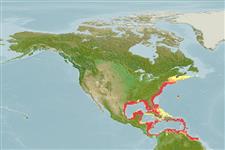Common names from other countries
>
Eupercaria/misc (Various families in series Eupercaria) >
Priacanthidae (Bigeyes or catalufas)
Etymology: Pristigenys: Greek, pristis = saw + Greek, genys, -yos = face (Ref. 45335).
More on author: Gill.
Environment: milieu / climate zone / depth range / distribution range
Écologie
marin récifal; profondeur 5 - 200 m. Subtropical; 45°N - 5°N, 98°W - 53°W
Western Atlantic: east coast of North America, Gulf of Mexico and the Caribbean. Aside from records from Brazil (which are in error), there are no other records from South America or in eastern Atlantic waters.
Taille / Poids / Âge
Maturity: Lm ? range ? - ? cm
Max length : 30.0 cm TL mâle / non sexé; (Ref. 7251); common length : 20.0 cm TL mâle / non sexé; (Ref. 5217)
Found on rocky bottoms between 5 (Ref. 5403) and 200 m depth, usually solitary and possibly territorial.
Life cycle and mating behavior
Maturité | Reproduction | Frai | Œufs | Fécondité | Larves
Starnes, W.C., 1988. Revision, phylogeny and biogeographic comments on the circumtropical marine percoid fish family Priacanthidae. Bull. Mar. Sci. 43(2):117-203. (Ref. 5403)
Statut dans la liste rouge de l'IUCN (Ref. 130435)
CITES (Ref. 128078)
Not Evaluated
Menace pour l'homme
Harmless
Utilisations par l'homme
Pêcheries: sans intérêt; Aquarium: Commercial
Plus d'informations
Taille/ÂgeCroissanceLongueur-poidsLongueur-longueurFréquences de longueursMorphométrieMorphologieLarvesDynamique des populations larvairesRecrutementAbondance
RéférencesAquacultureProfil d'aquacultureSouchesGénétiqueElectrophoresesHéritabilitéPathologiesTraitementMass conversion
CollaborateursImagesStamps, Coins Misc.SonsCiguateraVitesseType de nageSurface branchialeOtolithesCerveauxVision
Outils
Articles particuliers
Télécharger en XML
Sources Internet
Estimates based on models
Preferred temperature (Ref.
115969): 10.3 - 27.5, mean 24.3 (based on 228 cells).
Phylogenetic diversity index (Ref.
82804): PD
50 = 0.5313 [Uniqueness, from 0.5 = low to 2.0 = high].
Bayesian length-weight: a=0.02239 (0.00929 - 0.05398), b=2.93 (2.73 - 3.13), in cm Total Length, based on LWR estimates for this (Sub)family-body shape (Ref.
93245).
Niveau trophique (Ref.
69278): 4.0 ±0.7 se; based on size and trophs of closest relatives
Résilience (Ref.
120179): Haut, temps minimum de doublement de population inférieur à 15 mois (Preliminary K or Fecundity.).
Fishing Vulnerability (Ref.
59153): Low vulnerability (20 of 100).
